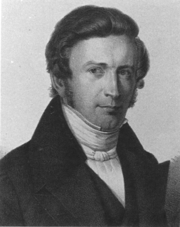
Arend Friedrich August Wiegmann
Encyclopedia

Germany
Germany , officially the Federal Republic of Germany , is a federal parliamentary republic in Europe. The country consists of 16 states while the capital and largest city is Berlin. Germany covers an area of 357,021 km2 and has a largely temperate seasonal climate...
zoologist
Zoology
Zoology |zoölogy]]), is the branch of biology that relates to the animal kingdom, including the structure, embryology, evolution, classification, habits, and distribution of all animals, both living and extinct...
. He studied medicine and philology
Philology
Philology is the study of language in written historical sources; it is a combination of literary studies, history and linguistics.Classical philology is the philology of Greek and Classical Latin...
at the University of Leipzig
University of Leipzig
The University of Leipzig , located in Leipzig in the Free State of Saxony, Germany, is one of the oldest universities in the world and the second-oldest university in Germany...
, and afterwards was an assistant to Martin Lichtenstein
Martin Lichtenstein
Martin Hinrich Carl Lichtenstein was a German physician, explorer, zoologist, and herpetologist.-Biography:...
(1780-1857) in Berlin. In 1828 he became a professor at Cologne
Cologne
Cologne is Germany's fourth-largest city , and is the largest city both in the Germany Federal State of North Rhine-Westphalia and within the Rhine-Ruhr Metropolitan Area, one of the major European metropolitan areas with more than ten million inhabitants.Cologne is located on both sides of the...
, and two years later was an extraordinary professor
Professor
A professor is a scholarly teacher; the precise meaning of the term varies by country. Literally, professor derives from Latin as a "person who professes" being usually an expert in arts or sciences; a teacher of high rank...
at the Humboldt University in Berlin
Berlin
Berlin is the capital city of Germany and is one of the 16 states of Germany. With a population of 3.45 million people, Berlin is Germany's largest city. It is the second most populous city proper and the seventh most populous urban area in the European Union...
.
Weigmann specialized in the study of herpetology
Herpetology
Herpetology is the branch of zoology concerned with the study of amphibians and reptiles...
and mammalogy
Mammalogy
In zoology, mammalogy is the study of mammals – a class of vertebrates with characteristics such as homeothermic metabolism, fur, four-chambered hearts, and complex nervous systems...
. In 1835, he founded, together with other scholars, the zoological periodical Archiv für Naturgeschichte, also known as "Wiegmann's Archive". With Johann Friedrich Ruthe
Johann Friedrich Ruthe
Johann Friedrich Ruthe Ruthé or von Ruthe was a German teacher and entomologist who specialised in Hymenoptera and Diptera.-Works:...
(1788-1859) he wrote an important textbook
Textbook
A textbook or coursebook is a manual of instruction in any branch of study. Textbooks are produced according to the demands of educational institutions...
of zoology
Zoology
Zoology |zoölogy]]), is the branch of biology that relates to the animal kingdom, including the structure, embryology, evolution, classification, habits, and distribution of all animals, both living and extinct...
called Handbuch der Zoologie, and in 1834 Wiegmann published Herpetologia Mexicana, a monograph
Monograph
A monograph is a work of writing upon a single subject, usually by a single author.It is often a scholarly essay or learned treatise, and may be released in the manner of a book or journal article. It is by definition a single document that forms a complete text in itself...
on the reptile
Reptile
Reptiles are members of a class of air-breathing, ectothermic vertebrates which are characterized by laying shelled eggs , and having skin covered in scales and/or scutes. They are tetrapods, either having four limbs or being descended from four-limbed ancestors...
s of Mexico.
- Note: He is not to be confused with his father Arend Friedrich WiegmannArend Friedrich WiegmannArend Joachim Friedrich Wiegmann was a German pharmacist and botanist who was a native of Hadersleben.Originally an apprentice pharmacist to his uncle in Braunschweig, he spent the following years working in several pharmacies in Germany and Switzerland...
(1771-1853), a German researcher in geneticsGeneticsGenetics , a discipline of biology, is the science of genes, heredity, and variation in living organisms....
.

